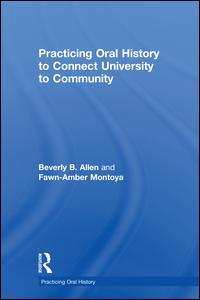Practicing Oral History to Connect University to Community Practicing Oral History Series
Auteurs : Montoya Fawn-Amber, Allen Beverly

Practicing Oral History to Connect University to Community illustrates best practices for using oral histories to foster a closer relationship between institutions of higher learning and the communities in which they are located.
Using case studies, the book describes how to plan and execute an oral history project that can help break down walls and bring together universities and their surrounding communities. It offers advice on how to locate funding sources, disseminate information about the results of a project, ensure the long-term preservation of the oral histories collected, and incorporate oral history into the classroom. Bringing together "town and gown," the book demonstrates how different communities can work together to discover new research opportunities and methods for preserving history.
Supported by examples, sample forms, and online resources, the book is an important resource both for oral historians and those working to improve relationships between university institutions and their neighboring communities.
Introduction 1 Building Relationships Between the University and the Community 2 Community Outreach 3 Funding an Oral History Project 4 The Process of Oral History: Planning 5 The Process of Oral History: The Interview 6 Ethics and Best Practices for Oral History 7 Telling the World: Sharing the Project and Making it Accessible to the Community 8 Oral History in the Classroom 9 Preservation 10 Community Collaborations Conclusion Appendices
Beverly B. Allen received her M.A. in History from the University of Missouri, St. Louis and her M.S. in Library Science from the University of Illinois, Urbana/Champaign. She is currently University Archivist at Colorado State University, Pueblo, and has written several articles about building ethnically diverse archival collections, including “Yo Soy Colorado: Three Collaborative Hispanic Cultural Heritage Initiatives” (Collaborative Librarianship, 2012).
Fawn-Amber Montoya received her Ph.D. from the University of Arizona in 2007. Montoya currently serves as the Director of the Honors Program at Colorado State University, Pueblo, and Montoya edited the collection Making an American Workforce: The Rockefellers and the Legacy of Ludlow (2014).
Date de parution : 08-2018
15.6x23.4 cm
Date de parution : 08-2018
15.6x23.4 cm
Thème de Practicing Oral History to Connect University to Community :
Mots-clés :
Oral History; project; Community Oral History Project; histories; Raid; collection; Community Oral History; programs; Oral History Projects; process; Raid Array; interviews; Oral History Program; partners; Oral History Collection; archives; Oral History Process; hard; Oral History Techniques; drive; Institutional Review Board; Beverly B; Allen; IRB; José Antonio Ortega; Digital Preservation; Houston Public Library; Digital Preservation Activities; Digital Oral Histories; Digital Library Software; Participatory Archives; Digital Preservation Program; Audio Video Interleave Format; OCLC’s WorldCat; Service Masters; Memory Workshop; Finding Aid; Digital Repository



